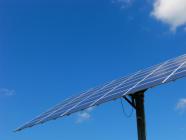Solar is by far the most
common renewable energy technology at the
individual consumer level. The main
drawback to solar is its relative lack of
reliability, for instance on days that are
cloudy or night time (though interestingly,
supermoons can contribute small amounts of
solar energy). As energy costs rise, so
does financial incentive to discover efficient
methods of storage for solar energy.
Great strides have been
made toward creating and improving grid-scale
storage technology, including reverse water
pumps, chemical energy storage and industrial
sized ion batteries. However, production
of individual consumer scale storage seems to be
lagging.
The most common method of
individual consumer storage is a rechargeable
battery. The
most efficient batteries may run only
essentials, such as lights and refrigerator, for
a few days without being recharged. A
battery would provide much less time for the
energy usage of an average household, including
televisions, clocks, appliances and other
electronic devices. While this may be a
viable option for regions with abundant sun,
like the desert southwest, most of the country
is not usually able to count on such reliable
weather.
The future is looking a
little
brighter though. In 2007 California
passed a law offering over $2 billion in
incentives for the solar industry, including
research and production of renewable storage
technology. In the US Congress, the
Storage Technology for Renewable & Green Energy
(STORAGE) Act has been introduced by Ron Wyden,
D-OR and Susan Collins, R-ME. This
bill "promotes the deployment of energy
storage technologies." Internationally,
Germany launched a program last month offering a
subsidy covering up to 30% of the purchase of a
solar energy storage system.
These incentives have
created a much more active market. At this
year's
Intersolar North America conference, there
were over 200 energy storage vendors, up from
about 12 just three years ago. According
to Markus Elsaesser, CO of Intersolar, there has
been a similar trend at the other Intersolar
conferences in Munich, Beijing, Mumbai and Sao
Paulo.
Elsaesser sees nothing but
a big future for solar. "We will go from
this year's 30 gigawatts of new installations to
over 100 gigawatts of new installations per
year" in the near future. Such an
expansion of solar usage can only spur greater
investment and development of storage
techniques.
COMMENT:
Off Grid
Reality
-
I can't imagine why any rational person
would imagine there are benefits to be off
grid. The electric utility industry started
130 years ago in north america as individual
host customers-many large industrial
companies at the time- took heat and
electric energy under contract from
independent power producers. During the
middle part of the last Century, most of
those customers abandoned self-generation
for grid supply because of the basic
economics and reliability. When you operate
your own plant, you have to have a back up
for that single point of failure whether
boiler feed pump or turbine-generator or any
of a myriad other parts necessary to keep
the unit running and producing....the
evolution of the interconnected grid along
with a move to high temperature/pressure
boilers and high voltage T & D drove the
economic choice as automotive, rubber,
hospitals, manufacturing plants of all ilk
shutdown their self-generation in favor of
utility supply.
Even with distributed energy
resources-generation and storage-we will
want to maintain the interconnected T&D
system. These technologies eneable its
evolution to the the ubiquitous self-healing
high resiliency grid of the next century.
And if done properly---will continue to
supply electric energy as it has for the
last 60 years, indexed to GDP growth! Why
would a rational person want to be "off the
grid"?

Copyright © 1996-2013 by
CyberTech,
Inc.
All rights reserved.
To subscribe or visit go to:
http://www.energycentral.com
To subscribe or visit go to:
http://www.energybiz.com
http://www.energybiz.com/article/13/09/solar-energy-how-close-grid-reality-0
[ED: I sincerely hope
that a lot of people totally disagree with the
logic of this commenting person.]
